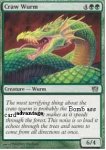N
Notepad
Guest
Tan and Tait started it off. Now its a site-wide discussion over at SCG. They're all arguing and discussing card advantage.
I could understand this if it was sparked by a want to spread some Magic theory, which it has become it seems. Although the discussion is a little heated and splintered.
However, this whole thing was not sparked by a desire to actually spread knowledge, it was sparked by their readers wanting to learn about it. It all began as this "get rich quick" type of lesson. The little BNet Skript Kiddiez who read SCG's content are too dumb to figure out the game, so they wanted to learn about Card Advantage, hoping the lesson would help turn them into the next Moshowitz.
Tough luck, kiddiez. I'll bet not even a fourth of them understand the discussions which are going on now. I'll bet every time they read about "virtual card advantage" they just about die from a brain rupture.
I could understand this if it was sparked by a want to spread some Magic theory, which it has become it seems. Although the discussion is a little heated and splintered.
However, this whole thing was not sparked by a desire to actually spread knowledge, it was sparked by their readers wanting to learn about it. It all began as this "get rich quick" type of lesson. The little BNet Skript Kiddiez who read SCG's content are too dumb to figure out the game, so they wanted to learn about Card Advantage, hoping the lesson would help turn them into the next Moshowitz.
Tough luck, kiddiez. I'll bet not even a fourth of them understand the discussions which are going on now. I'll bet every time they read about "virtual card advantage" they just about die from a brain rupture.

